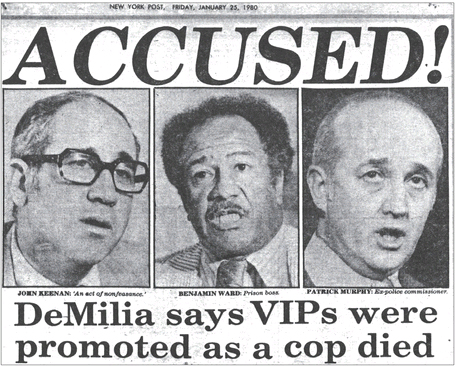Circle of Six (21 page)
Authors: Randy Jurgensen
He was surprised, “We're out of the 2-8? Where are we gonna work?”
I jabbed my thumb up to the ceiling, “Upstairs with Lieutenant Queeg.”
My first call was to Van Lindt. He verified that Phil's Uncle Frank and Aunt Tessie, acting on behalf of the Cardillo family, made it clear that they were on top of the investigation. “They're under the assumption that superior officers are stonewalling, because they may have something to hide in regard to the shooting,” he said. “They don't have anything to do with this shooting, do they, Randy?”
“No, John, not with the shooting.”
“Well, where are they coming up with this information? It's only going to screw us up in the trial if they appear to be hostile, Randy. You've got to choke this immediately.”
“I'll handle it, John.”
Frank and Tessie Cardillo were old friends. They'd owned a florist shop in east Harlem for thirty years before folding up the tents and relocating to Astoria, Queens. I wasn't looking forward to this visit, because yet again, I'd be placed in the middle of this investigation, having to justify my actions, or what the Cardillos had perceived as inaction. I had to allay all their fears. I needed to reassure them that a cover-up by One PP wasn't impeding the investigation. It was my job to turn them from the gossip to the truth. I knew it was going to be difficult, because it was Phil's partners who had their ears.
I hadn't seen either Frank or Tessie Cardillo since the funeral, so this was somewhat of a tearful reunion. I briefed them on what I viewed as the progress of the case, and I assured them that I was not motivated by anyone or anything other than a deep-rooted desire to see justice prevail. Phil's killer, I promised, would be caught.
They wanted to know why I wasn't investigating the job's hierarchy. My
answer was direct: no member of the NYPD shot Phil Cardillo. A Muslim who was present at the mosque shot and killed him, and that was the only person I was focusing on. I went on to explain that the job was preparing its own investigation, the
Blue Book
, into what had occurred that day. But I'd have nothing to do with that part of the investigation.
They seemed less anxious after I made things clear. We hugged, and then I plaintively asked that they not make any calls to the DA's office, the PBA, or any other cops regarding the case. I left them my home number and told them if they had any questions about the case, I'd be the only one to talk to, since I was the only detective working the case.
I tried to remain above board with Muldoon. The next series of interviews were conducted his way, one at a time. He insisted on knowing exactly what was going to be asked of each cop, then he would call the individual cop's command, and he'd work out a tour change with that precinct's roll call. Getting cops into the 2-5 took twice as long as the whole interview process took in the 2-8. I got tired of playing games. The job had become a tangle of blue tape, and that was becoming a liability to my case. The clock was ticking, and it was time to get in the game. I was going to handle Muldoon the way I'd handled a million or so third-grade perps who tried to derail one of my investigations with divisive behavior. Muldoon was a simple math equation that had to be solved. They were going to be fed disinformation, much the way I had been fed it. I would create an adjunct case, one that had nothing to do with my real investigation. I'd write up meaningless fives and requests that I knew would take forever to acquire. This would keep all of them in a spin cycle far away from my real investigation.
I gave Muldoon a list of thirteen cops, all of whom I'd already interviewed. While he dragged his feet calling them in, I'd be out in the field, talking with the cops who mattered.
By doing this, I'd turned a page, not only in this case, but also in life. I was slowly crossing over the line. I saw my insubordinate behavior as the only card I had to play. I needed to be left alone to conduct a proper investigation. In essence, they pushed me over that line. The problem is, once you've crossed the line, it's hard to distinguish between right and wrong and impossible to cross back over. This was the beginning of my end.
While he was on the phone chasing his tail, I had cleared all of the cops, and I had the beginnings of an excellent timeline. The first third of the case was set, the identification of the cops. The next part of the case
would bring me face-to-face with the other witnesses, and hopefully, the shooter. But without access to the mosque or any of its members, it would be nearly impossible to develop a timeline for the Muslims. I had no one to interview. This next part would have to be carefully plotted and covertly executed. Like before, I'd have to bring the mosque and its members to the cops. But first, I had to attend to some pressing personal business. I was getting married.
All the police were interviewed, their statements secured in the fives. This was the perfect opportunity to take a break in the action. Though the wedding was planned months in advance, Muldoon had no idea I'd be taking off for nine days.
His head was buried in paper when I entered his office. I knew this would lead to another hissy fit, so I decided to leave the door open.
“Lieutenant Muldoon?”
He didn't acknowledge me. “Just want you to know, Sunday is my wedding, and starting in,” I looked at my watch, it was nearly 6 p.m., “ten minutes, I'm on vacation till next Monday.”
This got his attention. He spun around in that noisy metal chair. “No, you're not.”
“Yes, I am.”
He held out his hands, palms facing the ceiling. “You can't just walk out. What about the men I'm bringing in for your interviews?”
“Well, Sir, I realized that I had already interviewed those men. All the cops at the scene are cleared. All preliminary interviews on our side are complete.”
I saw cold realization crawl across his face. He knew he had been played, but what could he do other than try to retain a sense of leadership, if not to me, to himself. “Jurgensen, you can't just walk out like this.”
“Watch me, Sir.” I turned and walked out. He didn't scream, rant, or rage. He was now the manageable math problem he presented himself as, and I was truly over the line.
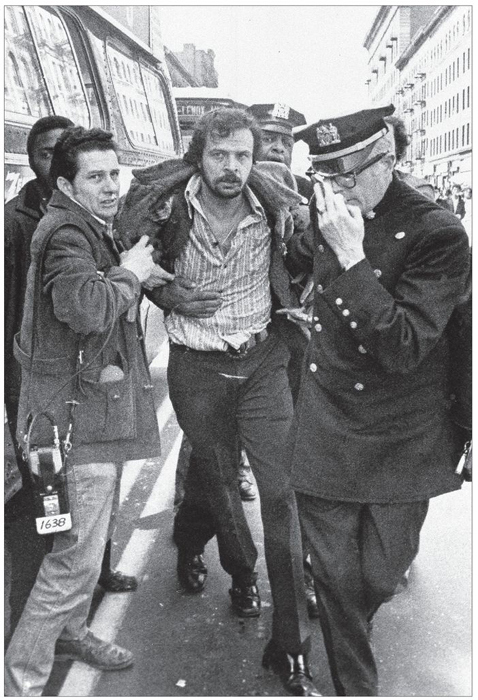
From left, Patrolman Jerry Harvey, Patrolman Lou D'Alessio, Detective Randy Jurgensen, Patrolman Gregory Harris, Deputy Inspector Jack Haugh, April 14, 1972.
Photo:
Jerry Mosey, courtesy AP/Wide World Photos
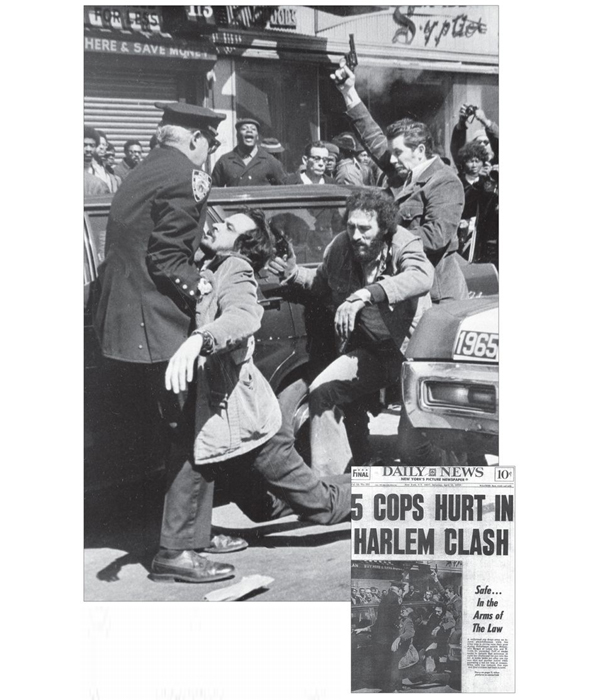
Foreground, from left, Deputy Inspector Jack Haugh, Detective Randy Jurgensen, Patrolman Raymond San Pedro, Patrolman Lou D'Alessio, April 14, 1972.
Photo:
Eddie Adams, courtesy AP/Wide World Photos
Inset:
Front cover of the New York
Daily News.
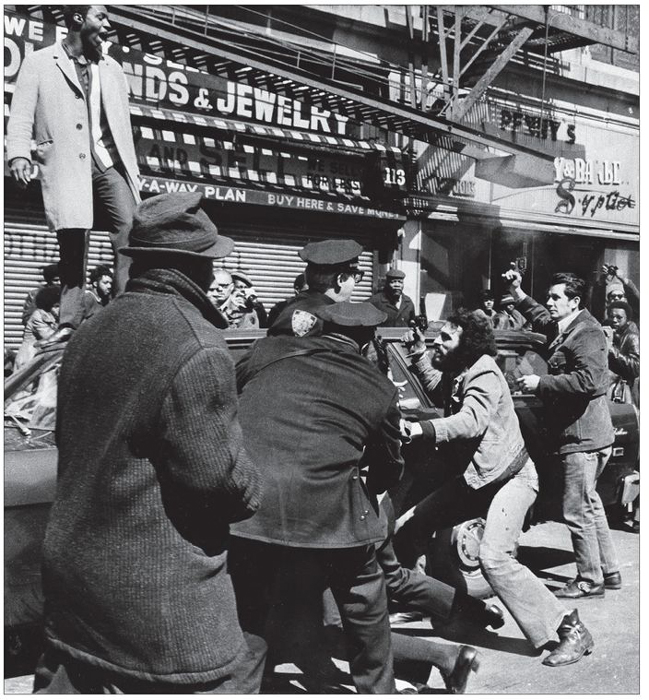
Above:
Foreground, from left, unidentified civilian, Patrolman Gregory Harris (back to camera, bending), Deputy Inspector Jack Haugh (standing), Patrolmen Raymond San Pedro and Lou D'Alessio (with guns). Legs on ground are Detective Jurgensen's. April 14, 1972.
Photo:
Eddie Adams, courtesy AP/Wide World Photos
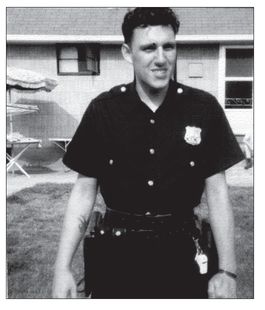
Left:
Patrolman Phillip Cardillo.
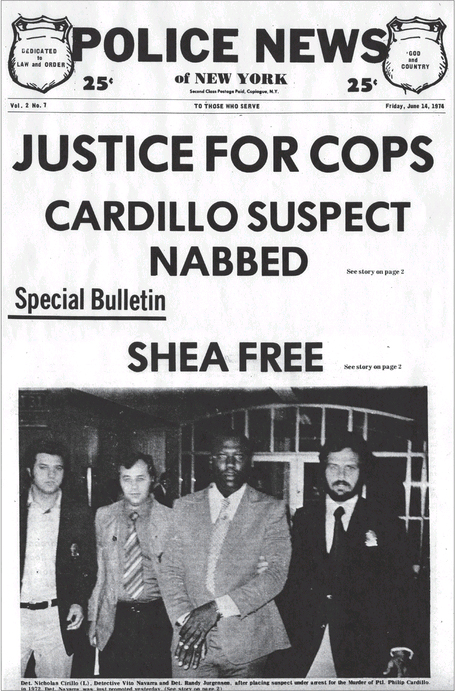
The arrest of Lewis 17X Dupree makes the front page of
Police News
. With Dupree, from left, Detectives Nick Cirillo, Vito Navarra, and Randy Jurgensen.
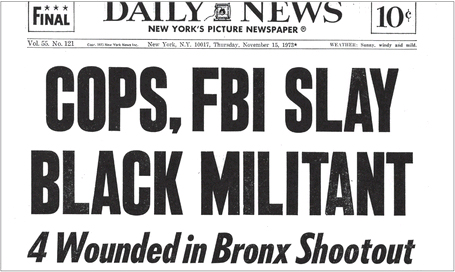
The NYPD ends the hunt for Twyman Meyers.
